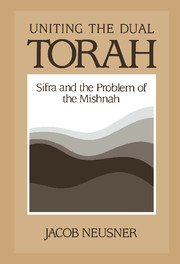Book contents
- Frontmatter
- Contents
- Preface
- Prologue
- 1 The Problem of the Mishnah
- 2 Torah as a Common Noun: The Solution of the Talmuds
- 3 A Sample of Sifra
- 4 From Common Noun to Proper Noun: Sifra's Re-presentation of the Two Torahs as One
- 5 Sifra's Alternative to the Mishnah's Topical Program and Its Order
- 6 Sifra's Alternative to the Mishnah's Logic of Cogent Discourse
- 7 Sifra's Alternative to the Mishnah's Proof of Propositions through Taxonomic Classification and Hierarchization
- 8 Re-presenting the Torah: Sifra's Rehabilitation of Taxonomic Logic
- 9 Torah as Proper Noun and the Structure of the Logic of Creation
- Appendix: The Distinctive Character of Sifra among Midrash Compilations
- Bibliography
- Index
7 - Sifra's Alternative to the Mishnah's Proof of Propositions through Taxonomic Classification and Hierarchization
Published online by Cambridge University Press: 06 July 2010
- Frontmatter
- Contents
- Preface
- Prologue
- 1 The Problem of the Mishnah
- 2 Torah as a Common Noun: The Solution of the Talmuds
- 3 A Sample of Sifra
- 4 From Common Noun to Proper Noun: Sifra's Re-presentation of the Two Torahs as One
- 5 Sifra's Alternative to the Mishnah's Topical Program and Its Order
- 6 Sifra's Alternative to the Mishnah's Logic of Cogent Discourse
- 7 Sifra's Alternative to the Mishnah's Proof of Propositions through Taxonomic Classification and Hierarchization
- 8 Re-presenting the Torah: Sifra's Rehabilitation of Taxonomic Logic
- 9 Torah as Proper Noun and the Structure of the Logic of Creation
- Appendix: The Distinctive Character of Sifra among Midrash Compilations
- Bibliography
- Index
Summary
An authorship determines a principle of the proof of proposition, allowing the demonstration, in detail, that things are one way, rather than some other, accord with one law, rather than another.… It is the argument of Sifra's authorship that without the revelation of the Torah, we are not able to effect any classification at all, we are left, that is to say, only with species, but no genus, only with cases, but no rules
The Importance of Classification in the System of the Mishnah
The system of philosophy expressed through concrete and detailed law presented by the Mishnah consists of a coherent logic and topic, a cogent world view, and comprehensive way of living. It is a world view that speaks of transcendent things, a way of life in response to the supernatural meaning of what is done, a heightened and deepened perception of the sanctification of Israel in deed and in deliberation. That paramount concern accounts for the centrality of classification, the appeal of the logic of hierarchical classification in the demonstration of comparisons and contrasts, and in the formation of the thought of the document. For sanctification in the Mishnah's system means establishing the stability, order, regularity, predictability, and reliability of Israel in the world of nature and supernature particularly at moments and in contexts of danger. It is through assigning to all things their rightful name, setting of all things in their proper position, that we discover the laws of stability, order, regularity, and predictability.
- Type
- Chapter
- Information
- Uniting the Dual TorahSifra and the Problem of the Mishnah, pp. 125 - 156Publisher: Cambridge University PressPrint publication year: 1990



